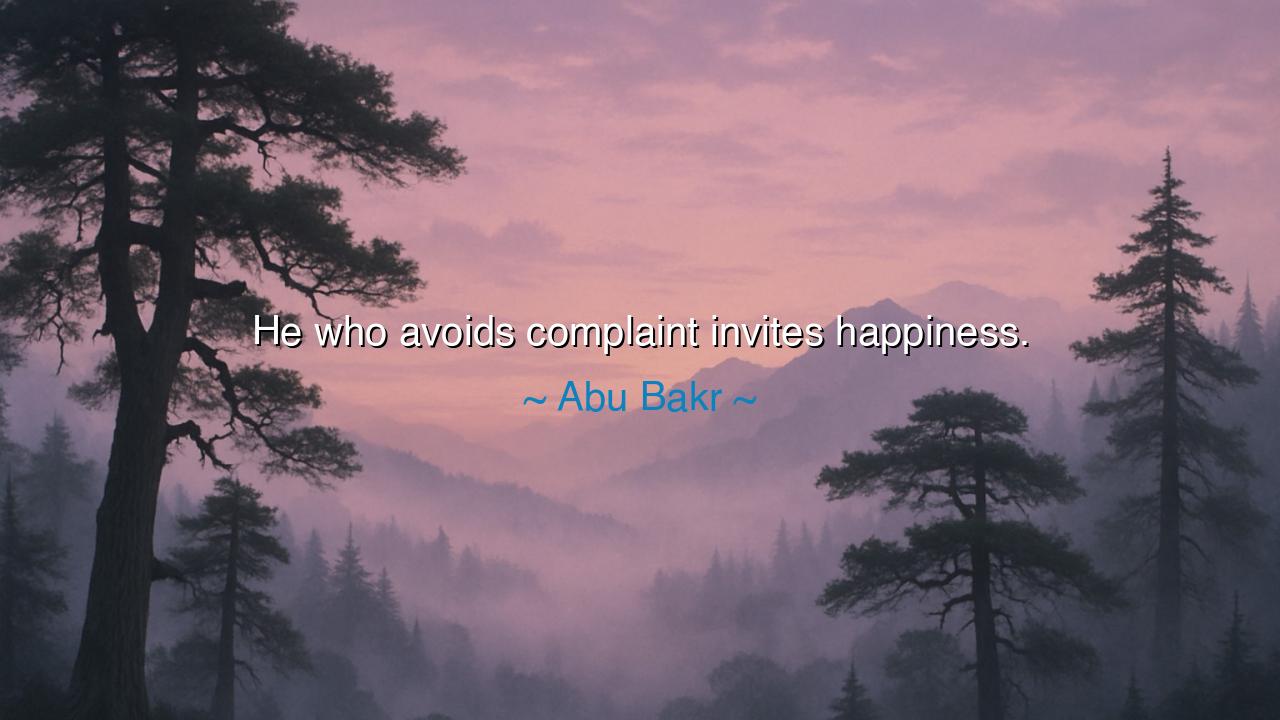
He who avoids complaint invites happiness.






When Abu Bakr, the first Caliph of Islam and one of the closest companions of the Prophet Muhammad (peace be upon him), said, “He who avoids complaint invites happiness,” he was not merely offering advice on good manners — he was unveiling a profound spiritual truth. This wisdom, born from a heart steeped in faith and humility, reminds us that happiness is not bestowed by fortune, nor stolen by hardship; it lives in the soul’s attitude toward life. To complain is to dwell on what is missing; to refrain is to recognize what is present. Thus, in silence, patience, and gratitude, one opens the door to inner peace — a peace unshaken by circumstance, a joy untouched by loss.
Abu Bakr’s life itself was a testament to this teaching. He lived through times of immense trial — exile, persecution, the loss of loved ones, the weight of leadership after the Prophet’s passing. Yet through all, he remained steadfast, calm, and grateful. He did not rail against fate nor lament what was taken from him; instead, he found strength in submission to the divine will. For to avoid complaint is not to suppress one’s pain, but to transform it into understanding. It is to say, “This too is part of the journey. This too has meaning.” And in that surrender, one discovers what Abu Bakr knew — that happiness enters where bitterness is refused.
In truth, complaint is a subtle thief. It whispers that the world owes us something, that joy will come only when things are different, that our peace depends on change outside of us. But the wise know that this is an illusion. Every moment spent in resentment is a moment lost to gratitude. The one who complains feeds dissatisfaction, while the one who accepts cultivates contentment. As the Qur’an teaches, “If you are grateful, I will surely increase you in blessings.” The ancient Greeks, too, held a similar understanding. Epictetus, the Stoic philosopher, taught that suffering arises not from events themselves, but from our judgments of them. In every tradition, wisdom points toward the same truth: to master the mind is to master happiness.
Consider the story of Helen Keller, the blind and deaf woman who transformed her limitations into a beacon of inspiration for millions. She once wrote, “Keep your face to the sunshine and you cannot see the shadows.” Though she could not see or hear, she lived with a joy that humbled the able-bodied. What made this possible? She refused to dwell on what she lacked. She did not complain about the darkness; she learned to feel the warmth of the light in her heart. Like Abu Bakr, she understood that complaint weakens the soul, but gratitude strengthens it. Her happiness, radiant and unyielding, was the natural reward of a mind trained to look for grace rather than grievance.
To avoid complaint does not mean to ignore injustice or remain silent in the face of wrong — Abu Bakr himself stood against oppression and spoke truth when needed. Rather, it means to guard the heart from the poison of constant dissatisfaction. It is to meet the trials of life with dignity, to seek solutions instead of sympathy, and to remember that hardship is not a punishment but a teacher. When we stop murmuring against destiny, we begin to hear the deeper voice of wisdom within us — the quiet assurance that even pain has purpose, even loss conceals a blessing yet unseen.
And what of happiness — that delicate flower so many chase and so few find? Abu Bakr teaches us that it grows best in the soil of contentment. The man who ceases to complain discovers joy not in having all he desires, but in desiring all he has. The woman who meets life with patience and gratitude finds that even ordinary moments shine with sacred light. Happiness, then, is not the result of a perfect life, but the expression of a peaceful soul. When we let go of the need to control or criticize, we create space within us for serenity to dwell. In silence, the heart breathes again; in acceptance, it begins to sing.
So, my listener, remember this ancient truth: complaint is the chain that binds the spirit; gratitude is the key that frees it. Each day offers you the choice — to curse the thorns or to bless the roses. Speak less of what you lack and more of what you love. When tempted to murmur, pause and breathe; when life wounds you, look for the hidden mercy behind the pain. For happiness is not given — it is invited, and its invitation is written in patience, humility, and trust.
Let this teaching of Abu Bakr dwell in your heart: to live without complaint is not to live without sorrow, but to live without surrendering to it. Be like the mountain that endures the storm without resentment, like the sun that rises again without protest. Then happiness will come to you not as a guest, but as a companion — walking beside you through all seasons of life, lighting even your darkest paths with the quiet glow of contentment.






AAdministratorAdministrator
Welcome, honored guests. Please leave a comment, we will respond soon